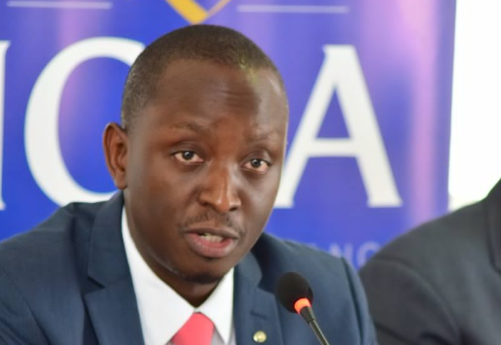DFCU Bank, registered as the Development Finance Company of Uganda Bank Limited will take its time to replace Chief of Business & Executive Director William Sekabembe after his resignation, dampening hopes of a speedy restructuring or even a break-up of the trouble commercial bank.
Sekabembe’s resignation came less than a fortnight after CDC Group Plc, the bank’s second majority shareholder seek to sell their shares. Shortly after the CDC announcement, Deepak Malik, the CEO of Arise B.V; dfcu’s majority shareholder also resigned from the board without giving reasons.
An insider told TheUgandan that the board did not appoint an interim ED but said it had asked the remaining executives under outgoing Managing Director Juma Kisaame — Andrew Kabeera, the current Chief Operating Officer and Agnes T. Isharaza the Company Secretary — to deputise in leading the company for now.
Sekabembe was appointed the Executive Director in August 2016.
Prior to his appointment, he was the Head of Development and Institutional Banking. He has over 18 years of banking experience with extensive Knowledge in Retail and Business Banking, Credit Risk Management and Product Development.
Sekabembe “was apparently going to KCB Bank Uganda for a Managing Director role,” Independent Communications analyst Muhereza Kyamutetera said. It was unclear to what extent the traditionally tight-lipped dfcu Bank will announce the shocking news but their public relations consulting company, Hill+Knowlton Strategies when contacted promised to share a statement about the developments shortly.
TROUBLED ACQUISITION
There is an imminent parliamentary report implicate dfcu and Bank of Uganda of collusion in the problematic Crane Bank sale, several media reports claim.
It is understood that a draft report by the Auditor General, has faulted Bank of Uganda for selling loans worth Shs135b from five failed banks to M/S Nile River Acquisition Company in 2007 at $5.25m (Shs8.9bn), a price that was 26% of the total secured loan portfolio and 7% of the total loan portfolio. This is said to have led to a loss of Shs126b according to the Auditor General.
After the Crane bank takeover in 2017, Dfcu’s annual net profit jump by more than 136% to Shs 127 billion while assets leaped up by 100% in 2017 – putting it right on the list of the most profitable banks in the country.
dfcu’s after-tax profit in 2016 was just Shs 46 billion before the Crane bank takeover. It was the first time Dfcu had crossed the Shs 100 billion threshold, becoming the fourth bank to do so in the country.

dfcu acquired Crane bank at about Shs 200 billion, but the bank’s management insist Crane bank was valued above Shs 1.3 trillion. Dfcu is listed on the Uganda Securities Exchange and is still battling a court case with Crane bank shareholders over the takeover.
Market analysts speculate that after CDC realized that the bank was facing hard times, it decided to sell its shares and watch from outside.











